被动语态(课件49张)
图片预览


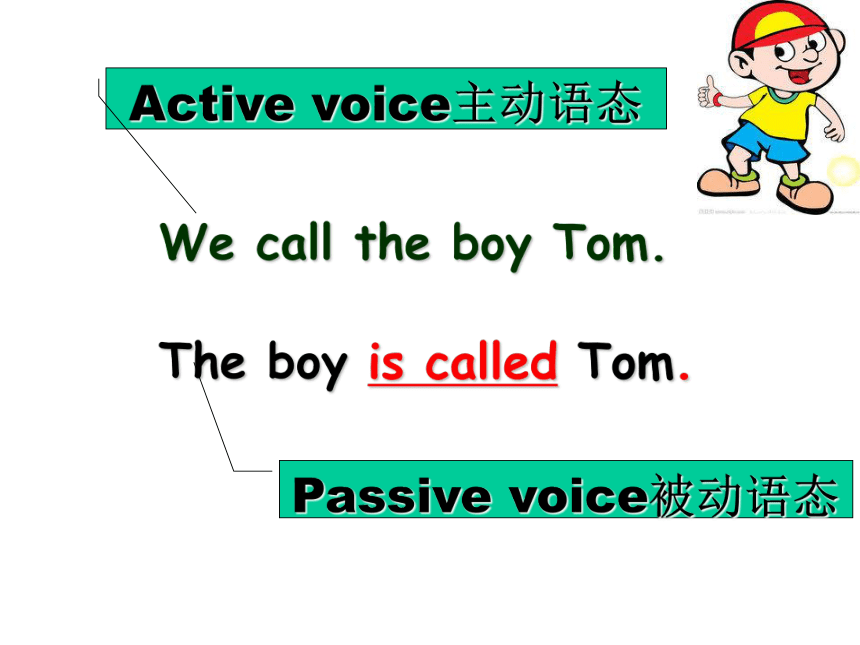
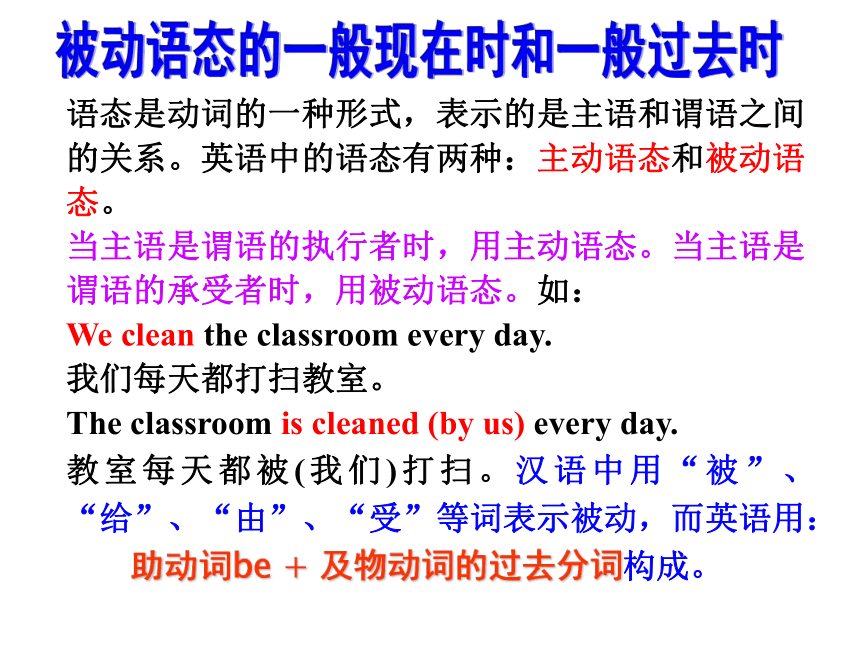

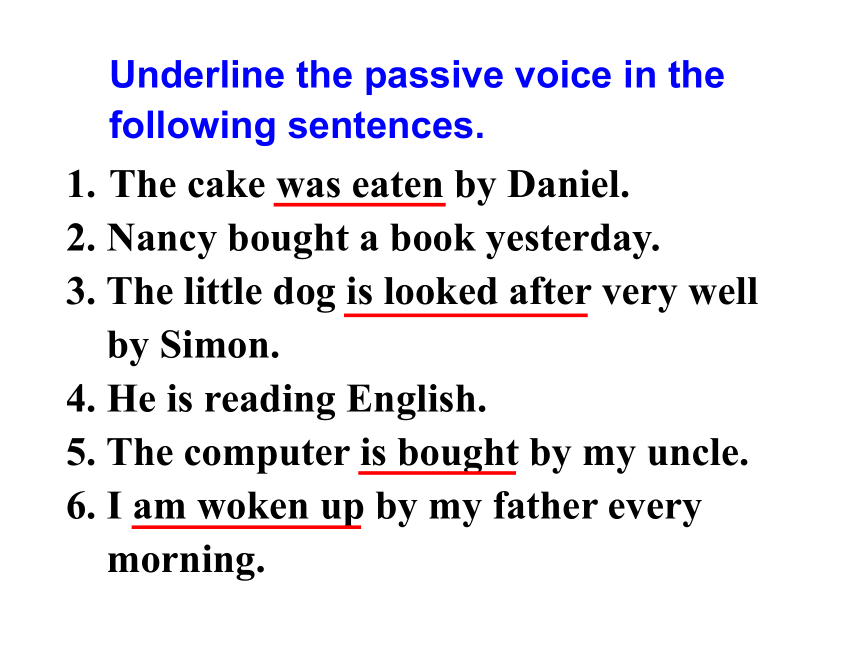

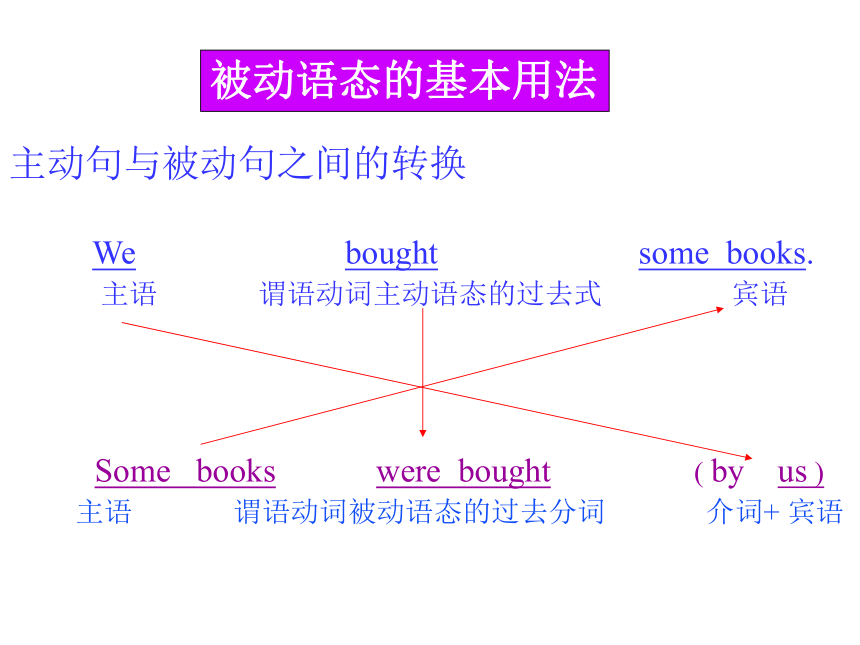
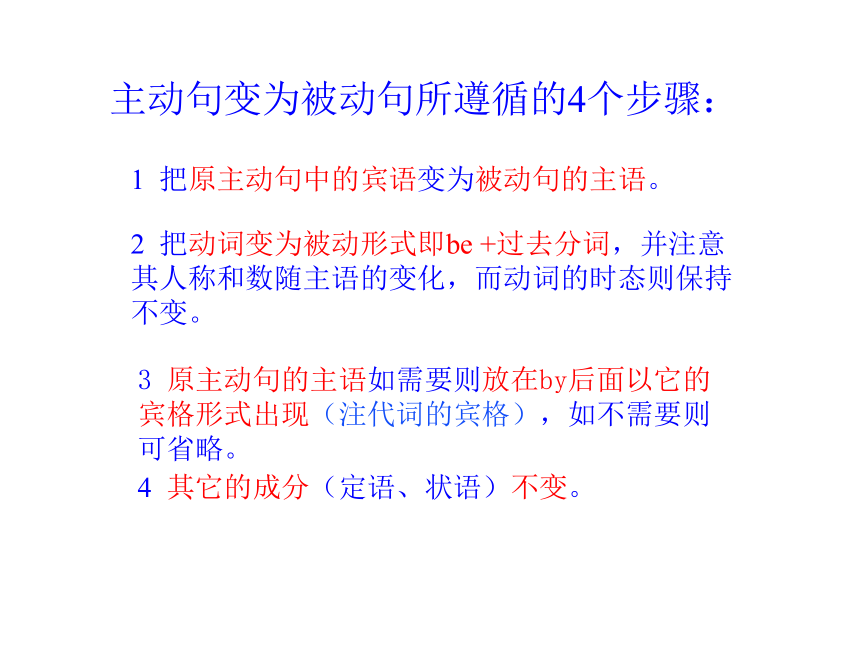
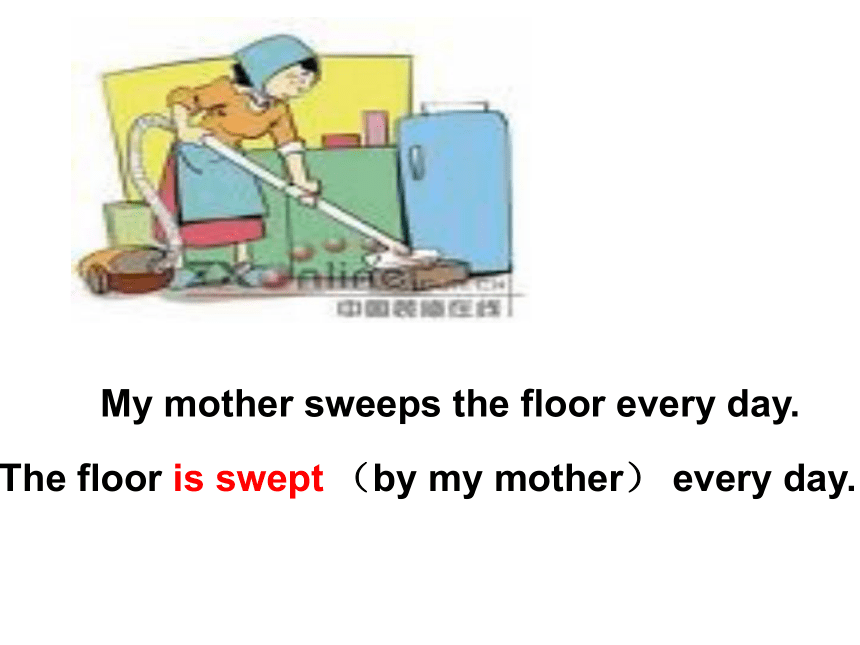
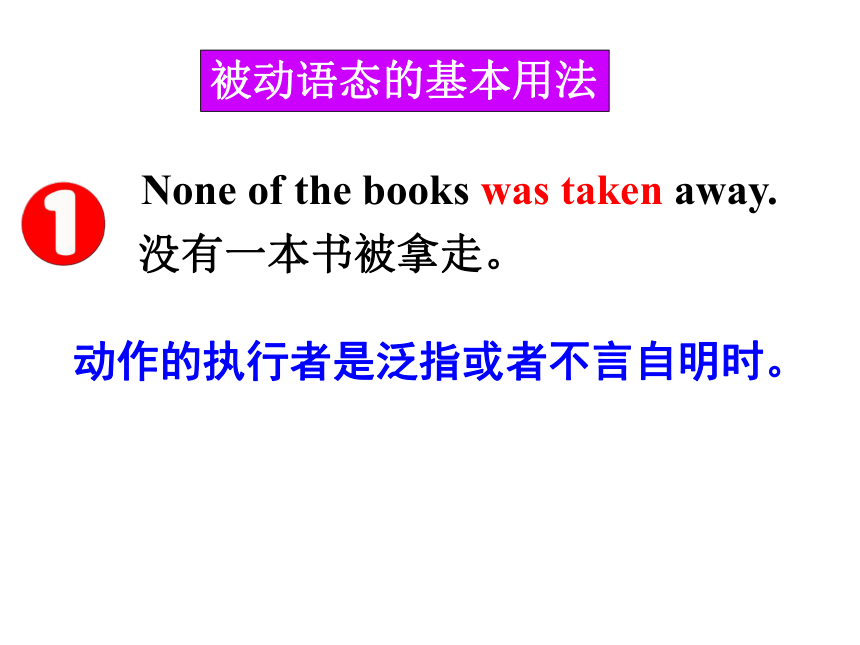
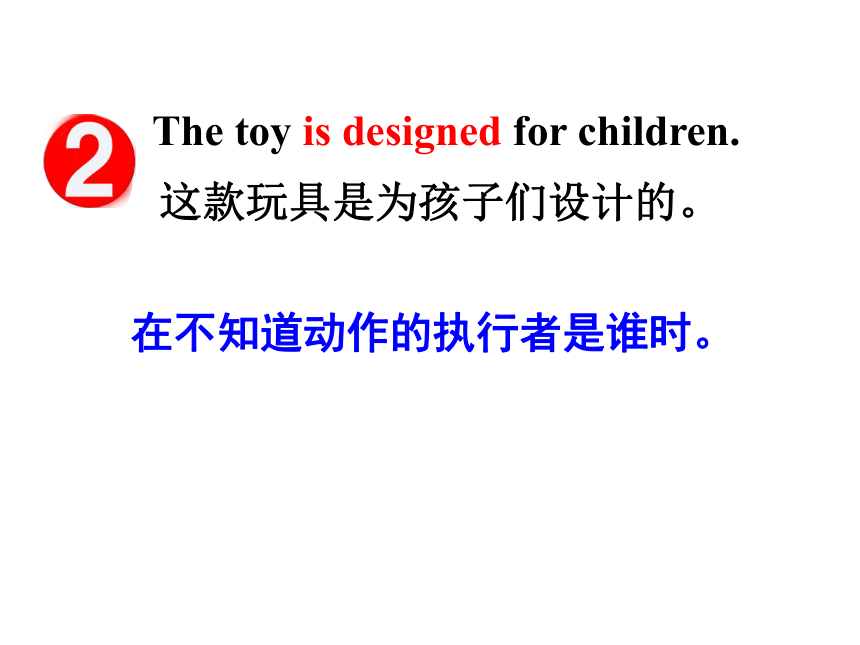
文档简介
The Passive Voice
1. About 80 per cent of these cases can be prevented and cured.
2. The plane is also used as a training center.
3. Also, local doctors and nurses are invited on board to learn about eye operations.
4. 150 patients are operated on.
把句子翻译成中文
被动语态
We call the boy Tom.
The boy is called Tom.
Active voice主动语态
Passive voice被动语态
语态是动词的一种形式,表示的是主语和谓语之间的关系。英语中的语态有两种:主动语态和被动语态。
当主语是谓语的执行者时,用主动语态。当主语是谓语的承受者时,用被动语态。如:
We clean the classroom every day.
我们每天都打扫教室。
The classroom is cleaned (by us) every day.
教室每天都被(我们)打扫。汉语中用“被”、“给”、“由”、“受”等词表示被动,而英语用:
助动词be + 及物动词的过去分词构成。
The lights were turned off by Tom.
The windows are cleaned every week.
Millie closed the door.
The TV was turned on.
The boy made a model plane.
A total(总数) of 8 questions are answered.
or
Active
Passive
Passive
Passive
Active
Passive
Active
Passive
The cake was eaten by Daniel.
2. Nancy bought a book yesterday.
3. The little dog is looked after very well
by Simon.
4. He is reading English.
5. The computer is bought by my uncle.
6. I am woken up by my father every
morning.
Underline the passive voice in the following sentences.
Passive Voice 被动语态
Be done
am done
is done
are done
一般现在时
一般过去时
was/were done
{
主动句与被动句之间的转换
We bought some books.
主语 谓语动词主动语态的过去式 宾语
Some books were bought ( by us )
主语 谓语动词被动语态的过去分词 介词+ 宾语
被动语态的基本用法
主动句变为被动句所遵循的4个步骤:
1 把原主动句中的宾语变为被动句的主语。
2 把动词变为被动形式即be +过去分词,并注意其人称和数随主语的变化,而动词的时态则保持不变。
3 原主动句的主语如需要则放在by后面以它的宾格形式出现(注代词的宾格),如不需要则可省略。
4 其它的成分(定语、状语)不变。
My mother sweeps the floor every day.
The floor is swept (by my mother) every day.
None of the books was taken away.
没有一本书被拿走。
动作的执行者是泛指或者不言自明时。
被动语态的基本用法
The toy is designed for children.
在不知道动作的执行者是谁时。
这款玩具是为孩子们设计的。
需要强调动作的承受者时。
My bike was repaired.
我的自行车修好了。
The problem was talked about just now.
出于委婉或礼貌而避谈动作的执行者时。
这个问题刚才被讨论过。
Mr Wu is liked by all of his students.
所有的学生都喜欢吴老师。
在被动语态的句子中, 如果我们需要指出动作的执行者, 可以由by引出。
P99-100 Part A,B
1. Today English _______ all over China.
A. teach B. teaches
C. is taught D. are taught
2. The meeting _______ two weeks ago.
A. hold B. was held
C. were held D. is held
3. The thief ________ by the police last night.
A. caught B. is caught
C. was caught D. were caught
4. The photos _______ when I was young.
A. were taken B. was taken
C. are taken D. is taken
5. Millie is my best friend. I ___ often ____ to her party.
A. is, invited B. am ,invited
C. are, invited D. was, invited
6. Last year Beijing ____ by a big sandstorm.
A. is hit B. were hit
C. will be hit D. was hit
被动语态的几种句型
1 肯定句 主语 + be + 过去分词 + (by…)
A sweet song was sung by her on the stage.
2 否定句 主语 + be + not +过去分词 + (by…)
3 一般疑问句 Be + 主语 +过去分词 + (by…)
A sweet song wasn’t sung by her on the stage.
Was a sweet song sung by her on the stage?
4 特殊疑问句 疑问词 + be + 主语 +过去分词 + (by…)
Where was a sweet song sung by her?
用所给动词的被动语态填空:
1) your room ________ (clean) every day?
2) Our classroom __________ ( not clean ) yesterday.
3) Both of the two books __________ ( lose) last Sunday.
4) The students ___________ ( ask ) to hand in their homework on time every day.
5) ---When this kind of computer
(make) in Hong Kong?
--- In 2000.
Is cleaned
wasn’t cleaned
were lost
are asked
was
made
(二) 被动语态的时态、人称和数的变化
主要体现在be的变化上,其形式与系动词be的变化形式完全一样。列表如下:
一般现在时:
一般过去时:
一般将来时:
含有情态动词
现在进行时:
过去进行时:
现在完成时:
am / is / are + done
was / were + done
shall / will + be done
should / would + be done
am / is / are + being + done
was / were + being + done
have / has + been + done
1. 一般现在时:
(1)People grow rice in the south of the country.
Rice is grown in the south of the country.
(2)The school doesn't allow us to enter the chemistry lab without a teacher.
We are not allowed to enter the chemistry lab without a teacher.
2. 一般过去时:
(1)They agreed on the building of a new car factory last month.
The building of a new car factory was agreed on last month.
(2)The students didn't forget his lessons easily.
His lessons were not easily forgotten.
3. 一般将来时:
(1)They will send cars abroad by sea.
Cars will be sent abroad by sea.
(2)They will give plenty of jobs to school-leavers.
Plenty of jobs will be given to school-leavers.
4.现在进行时:
(1)The radio is broadcasting English lessons.
English lessons are being broadcasted on the radio.
(2) We are painting the rooms.
The rooms are being painted.
5. 过去进行时:
(1)The workers were mending the road.
The road was being mended.
(2)This time last year we were planting trees here.
Trees were being planted here this time last year.
6. 现在完成时:
(1)Someone has told me the sports meeting might be put off.
I have been told the sports meeting might be put off.
(2)He has brought his book here.
His book has been brought here.
7.含有情态动词的被动语态是由“情态动词+ be+ 及物动词的过去分词”构成。
(1)You must hand in your compositions after class.
Your compositions must be handed in after class.
(2)He can write a great many letters with the computer.
A great many letters can be written with the computer by him.
a.感官动词
see, hear,watch,notice
b.使役动词
let, make
c.help
help sb (to) do
sb be seen/heard to do sth
sb be let/made to do sth
sb be helped to do sth
1.The boss made the workers work all day.
2.I often hear her sing in the room.
3.We saw some boys playing football .
The workers were made to work all day.
She is often heard to sing in the room .
Some boys were seen playing football .
He teaches us English.
主语 谓语 间宾 直宾
注意:常把间接宾语(即sb)变为主语。
We are taught English (by him).
若把直接宾语(即sth.)变为被动句的主语时,常在保留宾语前加to或for。
English is taught to us (by him).
在下列动词后,常在间接宾语前用介词 to,如:
bring, give, hand, lend, offer, pass, pay, promise, sell, show, take, teach, tell 等。
(1) The book was showed to the class.
(2) My bike was lent to her.
在下列动词后,间接宾语前用介词 for, 如:
build, buy, cook, cut, choose, do, fetch, find, fix, get, keep, make, order, paint, play, sing 等。
(1) A new skirt was made for me.
(2) The meat was cooked for us.
(3) Some country music was played for us.
The boy __________________.
(常受到嘲笑)
The children ______________________.
(应该得到良好的照顾)
is often laughed at
should be looked after well
IV. 带复合宾语(宾语+ 宾补)的动词改被动语态时,把主动结构中的宾语改为主语,而宾语补足语保留在谓语动词后面。如:
(1) We always keep the classroom clean.
→The classroom is always kept clean.
(2) She told us to follow her instructions.
→We were told to follow her instructions.
V. 当主动句的主语是nobody, no one等否定意义的不定代词时,被动句中将其变为anybody, 作by的宾语,并将谓语动词变为否定的被动语态。如:
Nobody can answer this question.
误:The question can be answered by nobody.
正:The question can not be answered by anybody.
×
VI. 当否定句中的宾语是anything, anybody, anyone等不定代词时,在被动句中应将其分别变为nothing, nobody, no one作主语,并将谓语动词变为肯定的被动语态。如:
They haven't done anything to make the river clean.
误:Anything hasn't been done to make the river clean.
正:Nothing has been done to make the river clean.
VII. 以who为主语开头的疑问句,变被动时,用by whom放在句首:
Who wrote the story?
误:Who was the story written?
正:By whom was the story written?
VIII. 有些动词既是及物又是不及物,当它们和well, badly, easily等副词连用时,表示主语内在品质或性能,是不及物,用主动表示被动,这时不用被动语态,常见的有:write, read, clean, sell, wash, cook 等。如:
(1)The cloth washes easily. 这布很好洗。
(2)The new product sells well. 这新产品很畅销。
对比:
The books sell well. (主动句)
The books were sold out. (被动句)
The meat didn’t cook well. (主动句)
The meat was cooked for a long time. (被动句)
1、不及物动词,后面不能直接带宾语,因此不能变被动语态。
happen, take place ,appear,disappear,begin,start,break down, belong to ,break out (爆发)
The accident ______ early this morning.
happened B. was happened
C. has happened
The Olympics __________ (take place )every four years.
take place
IX。不用被动语态的情况
2,感官系动词一般用主动形式表示被动意义,如:feel,look, seem, taste, sound, remain等。
(1)— Do you like the material? — Yes, it feels very soft.
误:It is felt very soft.
(2)The food tastes delicious.
误:The food is tasted delicious.
(3)The pop music sounds beautiful.
误:The pop music is sounded beautiful.
3. 表示静态的及物动词不用被动语态
have / fit / own
I have a TV set.
The coat fits me well.
【正】Look at the blackboard,please.
【误】The blackboard is looked at by you.
4.祈使句一般没有被动语态。
5.反身代词在句中作宾语时,不能用被动语态。
【正】You must look after yourself.
【误】Yourself must be looked after
X. 在汉语中,有一类句子不出现主语,在英语中一般可用被动结构来表示,例如:
据说…… It is said that …
据报导…… It is reported that …
据推测…… It is supposed that …
希望…… It is hoped that …
众所周知…… It is well known that …
普遍认为…… It is generally considered that …
有人建议…… It is suggested that …
1) It is reported that it is going to rain tomorrow.
2) It is well known that Thomas Edison invented the electric lamp.
(三)、有些动词常用于被动语态
He was born in Nanjing.
他生于南京。
The mobile phone was made in China.
这部手机是中国制造的。
1. --Why didn’t you go to Jim’s birthday party?--Oh. I______________(not invite)
??2.--What do you want, sir?--Could you tell me if computers___________(sell) in this shop.
?? 3. --A lot of things should_________(do) to protect the environment. --I agree with you..
4.Great changes____________(take) place in my hometown since 1990.
5. --When ______the bridge______(build)? Do you know?-- Two years ago.
6.?? ----Can I take the magazine out of the reading room?
----Sorry Magazines of this kind can’t_________(take) out.
wasn’t invited
are sold
be done
have taken
was
built
be taken
?1. If city noises ____ from increasing,people ____ shout
to be heard even at dinner.
??A. are not kept;will have to?
?B. are not kept;have???
?C. do not keep;will have to???
?D. do not keep;have to? ?
?2. The fifth generation computers, ____ now.
?A. developed B. have developed
?C. are being developed D. will have been developed
?3. --- ____ the sports meet might be put off.
??? --- Yes,it all depends on the weather.
?? ?A. I've been told ??B. I've told
?C. I'm told ???? D. I told
A
C
A
4. I need one more stamp before my collection ___.
?A. has completed ?? B. completes
?C. has been completed ?D. is completed
?5. Rainforests ___ and burned at such a speed
that they will disappear from the earth in the near future.
?A. cut ???? B. are cut
?C. are being cut ??? D. had been cut
?6. The new bridge ___ by the end of last month.?
?A. has been designed???????
?B. had been designed
?C. was designed ?? ?
?D. would be designed
D
C
B
7. Great changes ___ in the city, and a lot of factories ___.??
?A. have been taken place; have been set up
?B. have taken place; have been set up
?C. have taken place; have set up?
?D. were taken place; were set up
8. That suit __ over 60 dollars.??
?A. had costed? B. costed C. is costed D. cost
9. --- Look! Everything here is under construction.
? ????? --- What’s the pretty small house that __ for?
?A. is being built ?? B. has been built
?C. is built ?? ?D. is building
10.--- Do you like the cloth?
????? --- Yes, it ___ very soft.
?A. is feeling ? B. felt ?C. feels?? D. is felt
B
D
A
C
11. It is difficult for a foreigner ____ Chinese.
?A. write ?? ?B. to write
?C. to be written? ??D. written
?12. I have no more letters ____ ,thank you.
?A. to type????? ?? B. typing
?C. to be typed? ??D. typed
?13. Take care! Don’t drop the ink on your shirt,
for it __ easily.
?A. won’t wash out ?B. won’t be washed out
?C. isn’t washed out ?D. isn’t washing out
B
C
A
14. The computers on the table ___ Professor Smith.?
?A. belongs ??? B. are belonged to
?C. belongs to ?? D. belong to
?15. --- What do you think of the book?
???????---Oh, excellent. It’s worth ___ a second time.?
?A. to read ?B. to be read C. reading D. being read
?16. The squirrel was lucky that it just missed ___.? ?
A. catching ?? B. to be caught
?C. being caught ??D. to catch? ?
?17. This page needed ___ again.
??A. being checked ?B. checked
?C. to check ?? D. to be checked
D
C
C
D
1. About 80 per cent of these cases can be prevented and cured.
2. The plane is also used as a training center.
3. Also, local doctors and nurses are invited on board to learn about eye operations.
4. 150 patients are operated on.
把句子翻译成中文
被动语态
We call the boy Tom.
The boy is called Tom.
Active voice主动语态
Passive voice被动语态
语态是动词的一种形式,表示的是主语和谓语之间的关系。英语中的语态有两种:主动语态和被动语态。
当主语是谓语的执行者时,用主动语态。当主语是谓语的承受者时,用被动语态。如:
We clean the classroom every day.
我们每天都打扫教室。
The classroom is cleaned (by us) every day.
教室每天都被(我们)打扫。汉语中用“被”、“给”、“由”、“受”等词表示被动,而英语用:
助动词be + 及物动词的过去分词构成。
The lights were turned off by Tom.
The windows are cleaned every week.
Millie closed the door.
The TV was turned on.
The boy made a model plane.
A total(总数) of 8 questions are answered.
or
Active
Passive
Passive
Passive
Active
Passive
Active
Passive
The cake was eaten by Daniel.
2. Nancy bought a book yesterday.
3. The little dog is looked after very well
by Simon.
4. He is reading English.
5. The computer is bought by my uncle.
6. I am woken up by my father every
morning.
Underline the passive voice in the following sentences.
Passive Voice 被动语态
Be done
am done
is done
are done
一般现在时
一般过去时
was/were done
{
主动句与被动句之间的转换
We bought some books.
主语 谓语动词主动语态的过去式 宾语
Some books were bought ( by us )
主语 谓语动词被动语态的过去分词 介词+ 宾语
被动语态的基本用法
主动句变为被动句所遵循的4个步骤:
1 把原主动句中的宾语变为被动句的主语。
2 把动词变为被动形式即be +过去分词,并注意其人称和数随主语的变化,而动词的时态则保持不变。
3 原主动句的主语如需要则放在by后面以它的宾格形式出现(注代词的宾格),如不需要则可省略。
4 其它的成分(定语、状语)不变。
My mother sweeps the floor every day.
The floor is swept (by my mother) every day.
None of the books was taken away.
没有一本书被拿走。
动作的执行者是泛指或者不言自明时。
被动语态的基本用法
The toy is designed for children.
在不知道动作的执行者是谁时。
这款玩具是为孩子们设计的。
需要强调动作的承受者时。
My bike was repaired.
我的自行车修好了。
The problem was talked about just now.
出于委婉或礼貌而避谈动作的执行者时。
这个问题刚才被讨论过。
Mr Wu is liked by all of his students.
所有的学生都喜欢吴老师。
在被动语态的句子中, 如果我们需要指出动作的执行者, 可以由by引出。
P99-100 Part A,B
1. Today English _______ all over China.
A. teach B. teaches
C. is taught D. are taught
2. The meeting _______ two weeks ago.
A. hold B. was held
C. were held D. is held
3. The thief ________ by the police last night.
A. caught B. is caught
C. was caught D. were caught
4. The photos _______ when I was young.
A. were taken B. was taken
C. are taken D. is taken
5. Millie is my best friend. I ___ often ____ to her party.
A. is, invited B. am ,invited
C. are, invited D. was, invited
6. Last year Beijing ____ by a big sandstorm.
A. is hit B. were hit
C. will be hit D. was hit
被动语态的几种句型
1 肯定句 主语 + be + 过去分词 + (by…)
A sweet song was sung by her on the stage.
2 否定句 主语 + be + not +过去分词 + (by…)
3 一般疑问句 Be + 主语 +过去分词 + (by…)
A sweet song wasn’t sung by her on the stage.
Was a sweet song sung by her on the stage?
4 特殊疑问句 疑问词 + be + 主语 +过去分词 + (by…)
Where was a sweet song sung by her?
用所给动词的被动语态填空:
1) your room ________ (clean) every day?
2) Our classroom __________ ( not clean ) yesterday.
3) Both of the two books __________ ( lose) last Sunday.
4) The students ___________ ( ask ) to hand in their homework on time every day.
5) ---When this kind of computer
(make) in Hong Kong?
--- In 2000.
Is cleaned
wasn’t cleaned
were lost
are asked
was
made
(二) 被动语态的时态、人称和数的变化
主要体现在be的变化上,其形式与系动词be的变化形式完全一样。列表如下:
一般现在时:
一般过去时:
一般将来时:
含有情态动词
现在进行时:
过去进行时:
现在完成时:
am / is / are + done
was / were + done
shall / will + be done
should / would + be done
am / is / are + being + done
was / were + being + done
have / has + been + done
1. 一般现在时:
(1)People grow rice in the south of the country.
Rice is grown in the south of the country.
(2)The school doesn't allow us to enter the chemistry lab without a teacher.
We are not allowed to enter the chemistry lab without a teacher.
2. 一般过去时:
(1)They agreed on the building of a new car factory last month.
The building of a new car factory was agreed on last month.
(2)The students didn't forget his lessons easily.
His lessons were not easily forgotten.
3. 一般将来时:
(1)They will send cars abroad by sea.
Cars will be sent abroad by sea.
(2)They will give plenty of jobs to school-leavers.
Plenty of jobs will be given to school-leavers.
4.现在进行时:
(1)The radio is broadcasting English lessons.
English lessons are being broadcasted on the radio.
(2) We are painting the rooms.
The rooms are being painted.
5. 过去进行时:
(1)The workers were mending the road.
The road was being mended.
(2)This time last year we were planting trees here.
Trees were being planted here this time last year.
6. 现在完成时:
(1)Someone has told me the sports meeting might be put off.
I have been told the sports meeting might be put off.
(2)He has brought his book here.
His book has been brought here.
7.含有情态动词的被动语态是由“情态动词+ be+ 及物动词的过去分词”构成。
(1)You must hand in your compositions after class.
Your compositions must be handed in after class.
(2)He can write a great many letters with the computer.
A great many letters can be written with the computer by him.
a.感官动词
see, hear,watch,notice
b.使役动词
let, make
c.help
help sb (to) do
sb be seen/heard to do sth
sb be let/made to do sth
sb be helped to do sth
1.The boss made the workers work all day.
2.I often hear her sing in the room.
3.We saw some boys playing football .
The workers were made to work all day.
She is often heard to sing in the room .
Some boys were seen playing football .
He teaches us English.
主语 谓语 间宾 直宾
注意:常把间接宾语(即sb)变为主语。
We are taught English (by him).
若把直接宾语(即sth.)变为被动句的主语时,常在保留宾语前加to或for。
English is taught to us (by him).
在下列动词后,常在间接宾语前用介词 to,如:
bring, give, hand, lend, offer, pass, pay, promise, sell, show, take, teach, tell 等。
(1) The book was showed to the class.
(2) My bike was lent to her.
在下列动词后,间接宾语前用介词 for, 如:
build, buy, cook, cut, choose, do, fetch, find, fix, get, keep, make, order, paint, play, sing 等。
(1) A new skirt was made for me.
(2) The meat was cooked for us.
(3) Some country music was played for us.
The boy __________________.
(常受到嘲笑)
The children ______________________.
(应该得到良好的照顾)
is often laughed at
should be looked after well
IV. 带复合宾语(宾语+ 宾补)的动词改被动语态时,把主动结构中的宾语改为主语,而宾语补足语保留在谓语动词后面。如:
(1) We always keep the classroom clean.
→The classroom is always kept clean.
(2) She told us to follow her instructions.
→We were told to follow her instructions.
V. 当主动句的主语是nobody, no one等否定意义的不定代词时,被动句中将其变为anybody, 作by的宾语,并将谓语动词变为否定的被动语态。如:
Nobody can answer this question.
误:The question can be answered by nobody.
正:The question can not be answered by anybody.
×
VI. 当否定句中的宾语是anything, anybody, anyone等不定代词时,在被动句中应将其分别变为nothing, nobody, no one作主语,并将谓语动词变为肯定的被动语态。如:
They haven't done anything to make the river clean.
误:Anything hasn't been done to make the river clean.
正:Nothing has been done to make the river clean.
VII. 以who为主语开头的疑问句,变被动时,用by whom放在句首:
Who wrote the story?
误:Who was the story written?
正:By whom was the story written?
VIII. 有些动词既是及物又是不及物,当它们和well, badly, easily等副词连用时,表示主语内在品质或性能,是不及物,用主动表示被动,这时不用被动语态,常见的有:write, read, clean, sell, wash, cook 等。如:
(1)The cloth washes easily. 这布很好洗。
(2)The new product sells well. 这新产品很畅销。
对比:
The books sell well. (主动句)
The books were sold out. (被动句)
The meat didn’t cook well. (主动句)
The meat was cooked for a long time. (被动句)
1、不及物动词,后面不能直接带宾语,因此不能变被动语态。
happen, take place ,appear,disappear,begin,start,break down, belong to ,break out (爆发)
The accident ______ early this morning.
happened B. was happened
C. has happened
The Olympics __________ (take place )every four years.
take place
IX。不用被动语态的情况
2,感官系动词一般用主动形式表示被动意义,如:feel,look, seem, taste, sound, remain等。
(1)— Do you like the material? — Yes, it feels very soft.
误:It is felt very soft.
(2)The food tastes delicious.
误:The food is tasted delicious.
(3)The pop music sounds beautiful.
误:The pop music is sounded beautiful.
3. 表示静态的及物动词不用被动语态
have / fit / own
I have a TV set.
The coat fits me well.
【正】Look at the blackboard,please.
【误】The blackboard is looked at by you.
4.祈使句一般没有被动语态。
5.反身代词在句中作宾语时,不能用被动语态。
【正】You must look after yourself.
【误】Yourself must be looked after
X. 在汉语中,有一类句子不出现主语,在英语中一般可用被动结构来表示,例如:
据说…… It is said that …
据报导…… It is reported that …
据推测…… It is supposed that …
希望…… It is hoped that …
众所周知…… It is well known that …
普遍认为…… It is generally considered that …
有人建议…… It is suggested that …
1) It is reported that it is going to rain tomorrow.
2) It is well known that Thomas Edison invented the electric lamp.
(三)、有些动词常用于被动语态
He was born in Nanjing.
他生于南京。
The mobile phone was made in China.
这部手机是中国制造的。
1. --Why didn’t you go to Jim’s birthday party?--Oh. I______________(not invite)
??2.--What do you want, sir?--Could you tell me if computers___________(sell) in this shop.
?? 3. --A lot of things should_________(do) to protect the environment. --I agree with you..
4.Great changes____________(take) place in my hometown since 1990.
5. --When ______the bridge______(build)? Do you know?-- Two years ago.
6.?? ----Can I take the magazine out of the reading room?
----Sorry Magazines of this kind can’t_________(take) out.
wasn’t invited
are sold
be done
have taken
was
built
be taken
?1. If city noises ____ from increasing,people ____ shout
to be heard even at dinner.
??A. are not kept;will have to?
?B. are not kept;have???
?C. do not keep;will have to???
?D. do not keep;have to? ?
?2. The fifth generation computers, ____ now.
?A. developed B. have developed
?C. are being developed D. will have been developed
?3. --- ____ the sports meet might be put off.
??? --- Yes,it all depends on the weather.
?? ?A. I've been told ??B. I've told
?C. I'm told ???? D. I told
A
C
A
4. I need one more stamp before my collection ___.
?A. has completed ?? B. completes
?C. has been completed ?D. is completed
?5. Rainforests ___ and burned at such a speed
that they will disappear from the earth in the near future.
?A. cut ???? B. are cut
?C. are being cut ??? D. had been cut
?6. The new bridge ___ by the end of last month.?
?A. has been designed???????
?B. had been designed
?C. was designed ?? ?
?D. would be designed
D
C
B
7. Great changes ___ in the city, and a lot of factories ___.??
?A. have been taken place; have been set up
?B. have taken place; have been set up
?C. have taken place; have set up?
?D. were taken place; were set up
8. That suit __ over 60 dollars.??
?A. had costed? B. costed C. is costed D. cost
9. --- Look! Everything here is under construction.
? ????? --- What’s the pretty small house that __ for?
?A. is being built ?? B. has been built
?C. is built ?? ?D. is building
10.--- Do you like the cloth?
????? --- Yes, it ___ very soft.
?A. is feeling ? B. felt ?C. feels?? D. is felt
B
D
A
C
11. It is difficult for a foreigner ____ Chinese.
?A. write ?? ?B. to write
?C. to be written? ??D. written
?12. I have no more letters ____ ,thank you.
?A. to type????? ?? B. typing
?C. to be typed? ??D. typed
?13. Take care! Don’t drop the ink on your shirt,
for it __ easily.
?A. won’t wash out ?B. won’t be washed out
?C. isn’t washed out ?D. isn’t washing out
B
C
A
14. The computers on the table ___ Professor Smith.?
?A. belongs ??? B. are belonged to
?C. belongs to ?? D. belong to
?15. --- What do you think of the book?
???????---Oh, excellent. It’s worth ___ a second time.?
?A. to read ?B. to be read C. reading D. being read
?16. The squirrel was lucky that it just missed ___.? ?
A. catching ?? B. to be caught
?C. being caught ??D. to catch? ?
?17. This page needed ___ again.
??A. being checked ?B. checked
?C. to check ?? D. to be checked
D
C
C
D
同课章节目录
- 词法
- 名词
- 动词和动词短语
- 动词语态
- 动词时态
- 助动词和情态动词
- 非谓语动词
- 冠词
- 代词
- 数词和量词
- 形容词副词及其比较等级
- 介词和介词短语
- 连词和感叹词
- 构词法
- 相似、相近词比较
- 句法
- 陈述句
- 一般疑问句和否定疑问句
- 特殊疑问句及选择疑问句
- 反意疑问句
- 存在句(There be句型)
- 宾语从句
- 定语从句
- 状语从句
- 主谓一致问题
- 简单句
- 并列句
- 复合句
- 主谓一致
- 主、表语从句
- 名词性从句
- 直接引语和间接引语
- 虚拟语气
- 感叹句
- 强调句
- 倒装句
- 祈使句
- 句子的成分
- 句子的分类
- 题型专区
- 单项选择部分
- 易错题
- 完形填空
- 阅读理解
- 词汇练习
- 听说训练
- 句型转换
- 补全对话
- 短文改错
- 翻译
- 书面表达
- 任务型阅读
- 语法填空
- 其他资料
